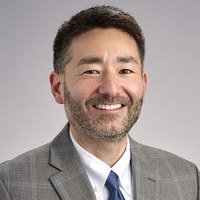SPHIS Home » News » Q&A with SPHIS Doctoral Candidate, Scott Skinner
Q&A with SPHIS Doctoral Candidate, Scott Skinner

Name: Scott Skinner, MBA, FACHE
Title: Director of Capital Equipment Planning – Sodexo
Degree Program: PhD(c) in Dept. of Health Management & Systems Sciences
Anticipated Graduation Date: Spring 2023
How did you get interested in the field of public health and health administration?
As kids we’re often asked, “what are you going to be when you grow up?” My answer was always “doctor.” I was encouraged to be a physician from an early age, perhaps some of which was due to my cultural background (I’m a second-generation Korean American). The American dream to many families like mine means rising above what the previous generation accomplished, often through advanced education and being in a profession. My family did have a history in healthcare. My paternal grandfather was an Army ambulance driver in World War II and my father was in medical administration in the Air Force. Upon matriculation to college, I declared myself a pre-med major. After a number of twists and turns, I ultimately realized I love health care, but I didn’t want to be the one providing the health care. I switched gears and earned undergraduate and graduate degrees in business and healthcare administration and went to work for a medical device services company.
Share your journey after graduating with your MBA and how/why you decided to return and get a PhD?
The idea of pursuing a terminal degree had long been in my mind. I had a gnawing feeling that I had more to contribute to my field through original research and teaching. More than 10 years after completing my MBA, I finally decided to take the leap. I explored numerous dissertation and non-dissertation doctoral programs before deciding that the Ph.D. at UofL SPHIS was the best fit for me. Also, my MBA is from UofL and I felt loyalty to a “hometown” program based at the Louisville Medical Center.
In what ways do you think your studies at SPHIS have and/or will apply to your current job and career aspirations?
I always believed I had a decent understanding of the health ecosystem, but my time at SPHIS proved me wrong! I feel I’ve gone on a quest where I’ve visited every corner and level of the public health domain and, more importantly, learned to synthesize ideas and apply them to practice. I feel such empowerment is necessary to operate at many different levels in healthcare. In my own career as a healthcare administrator and now consultant, I will be better equipped to consider the macro implications for the work I do in a specific area.
Help give readers an idea of what your day-to-day activities and responsibilities.
I’m a medical device consultant and conduct assessments for client hospitals where my company is providing on-site services. In a typical day I’ll work with on-site colleagues to gather feedback, process medical device data using proprietary methodologies, and develop complex recommendations for presentation to client executives. The recommendations are used to make important decisions on what medical devices should be retained or replaced, so they can have a very real impact on healthcare. I’m a virtual worker but will occasionally meet with clients at their hospital.
What advice would you give new students just beginning their public health journey?
I can’t emphasize enough the power of making connections with and getting to know everyone: peers, leaders, support staff, and industry experts. Learn what they have to share, and what you can share with them in return. Get to know those who have different backgrounds, interests, and perspectives. Some of my most valuable experiences at SPHIS were in courses outside my department with people very different than myself. Push yourself out of your comfort zone!
What advice would you give a student getting ready to graduate with a public health degree?
A friend of mine--who for years successfully managed a hospital diagnostic department--always reminds me to never forget about the individuals ultimately at the receiving end of healthcare. In my current work, it’s possible to get lost in data and lose sight of the human experience. If you find yourself in such a role, find a way to stay connected by getting out in the field somehow from time-to-time.
Anything else you would like to add?
Yes! I’ll leave you with one of my favorite quotes. “Don’t ask yourself what the world needs. Ask yourself what makes you come alive, and go do that, because what the world needs is people who have come alive.” --Howard Thurman
Connect with Scott on LinkedIn
Scott was recently voted in as a board member at Supplies Over Seas, a Louisville-based 501(c)(3) that meets critical health care needs in medically impoverished communities around the world by collecting and distributing surplus medical supplies and equipment.






